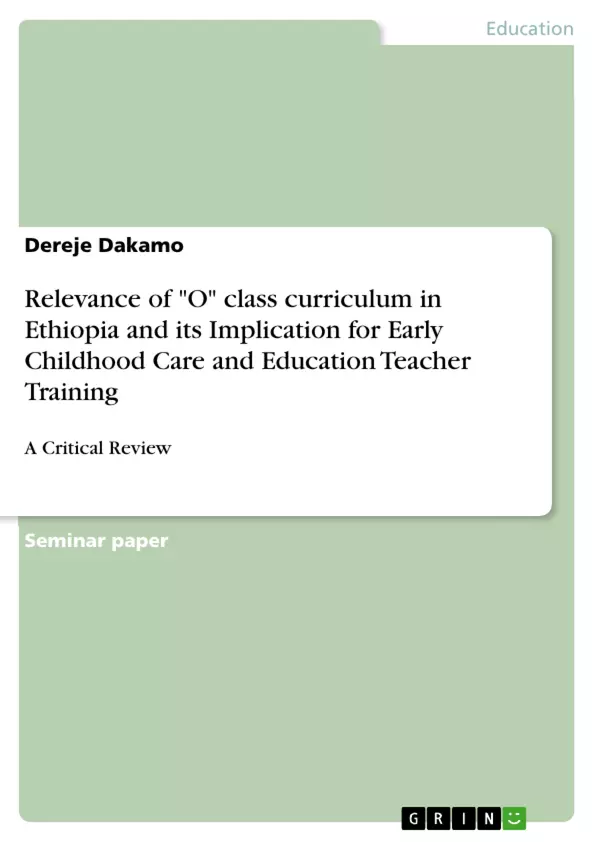This study was aimed at investigation of the relevance of O class curriculum in Ethiopia. Its implications for early childhood care and education teacher education was stressed. Descriptive survey approach was employed as a quantitative research design. Moreover, four regional states randomly selected were involved in the study. Document review was the main data gathering tool in the study. Findings from the study reveal Ethiopian O class curriculum is not relevant for young children attending the program. In light of internationally recognized child pedagogy, Ethiopian O class teaches children of age 6 all solid subjects like any grade level. Therefore, the researcher recommends Ethiopian education policy developers need to involve professionals in the area.
Inhaltsverzeichnis (Table of Contents)
- Introduction
- Background of the Study
- Statement of the Problem
- Basic Research Questions
- Objectives of the Study
- General Objective
- Specific Objectives
- Significance of the Study
- Review of the Related Literature
- Defining Early Childhood Care and Education
- Historical Development of ECCE and O class program
- ECCE in Global Context
- ECCE in Ethiopia
- The nature of O class program
- Early Childhood Care and Education vs. O class Curriculum
- Feature of O Class Program
- Content
- Importance of Early Childhood Care and Education Program
- Chapter Three: Research Methodology
- Research Design
- Study Area
- Data Collection Instruments
- Method of Data Analysis and Interpretation
- Ethical Consideration
- Chapter Four: Data Analysis and Interpretation
- Contents Planned to be Taught
- Teaching Methods Suggested
- Assessment Tools Recommended
- Written Test
- Questioning and Answering
- Learning Environment Mentioned
- Chapter Five: Summary, Conclusion and Recommendations
- Summary
- Conclusion
- Recommendations
- Reference
Zielsetzung und Themenschwerpunkte (Objectives and Key Themes)
This study aims to investigate the relevance of the O class curriculum in Ethiopia and its implications for early childhood care and education teacher training. The study employs a descriptive survey approach and focuses on the implementation of the O class program in Ethiopia, exploring its alignment with internationally recognized child pedagogy. The study analyzes the curriculum's content, teaching methods, and assessment tools to determine its appropriateness for young children.
- Relevance of the O class curriculum in Ethiopia.
- Alignment of the O class curriculum with internationally recognized child pedagogy.
- Implications of the O class curriculum for early childhood care and education teacher training.
- Effectiveness of the O class curriculum in preparing children for primary education.
- Potential for improvement in the O class curriculum and its implementation.
Zusammenfassung der Kapitel (Chapter Summaries)
The introduction provides a background on the importance of early childhood care and education (ECCE) and highlights the need for a well-designed and relevant curriculum for young children. It discusses the historical development of ECCE in Ethiopia and the recent introduction of the O class program as an alternative ECCE model. The statement of the problem emphasizes the lack of understanding regarding the relevance of the O class program and its alignment with internationally recognized child pedagogy.
Chapter Three outlines the research methodology employed in the study, which includes a descriptive survey approach, document review, and analysis of the O class curriculum. Chapter Four presents the data analysis and interpretation, focusing on the curriculum's content, teaching methods, and assessment tools. This chapter also examines the learning environment and the extent to which the O class program is implemented in accordance with recognized ECCE principles.
Schlüsselwörter (Keywords)
The main keywords and focus topics of this study include early childhood care and education (ECCE), O class curriculum, Ethiopia, relevance, child pedagogy, teacher training, curriculum analysis, and educational policy.
- Quote paper
- Dereje Dakamo (Author), 2020, Relevance of "O" class curriculum in Ethiopia and its Implication for Early Childhood Care and Education Teacher Training, Munich, GRIN Verlag, https://www.grin.com/document/537321



